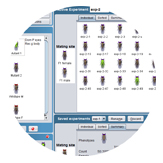 Professor Michelle Smith
Professor Michelle Smith
Title: Identifying and Changing Persistent Conceptual Difficulties in Biology
Seminar Date & Time: Monday, May 13, 2013 @ 2:00 pm
Listen to the audio from Professor Smith’s Seminar
Michelle Smith is an Assistant Professor at the University of Maine in the School of Biology and Ecology and the Research in STEM Education (RiSE) Center. Her work focuses on how to help students learn biology and instructors adopt promising educational practices in their classrooms. Specifically, she is interested in investigating conceptual difficulties in genetics, determining what makes peer discussion an effective learning tool in both large-lecture and small-enrollment courses, and collaborating with biology instructors on science education research questions in an effort to facilitate course transformation.
During her seminar titled Identifying & Changing Persistent Conceptual Difficulties in Biology, Professor Smith discussed her biology education work to increase students’ retention of knowledge and understanding of key biological concepts. Professor Smith cited the NSF and AAAS Vision & Change report that calls for instructors to focus upon core biological concepts to increase biological literacy and biology-specific core competencies. The report calls for the use of a scientific mindset in teaching by incorporating empirically validated methods in the classroom, including informing students of intended learning goals, incorporating active-learning techniques and utilizing assessment methods to gauge student understanding.
In her own classroom at the University of Maine, Professor Smith has utilized concept assessments to determine the level of her students’ understanding. In her seminar, Professor Smith described the concept assessments, which assess changes in student understanding, the impact of those changes, and help determine areas of conceptual difficulties that she has used in her own classroom. There are many methods instructors can utilize to perform concept assessments, including think aloud interviews, short answer questions, and multiple-choice questions.
Prof. Smith and others at the University of Colorado at Boulder developed the Genetics Concept Assessment (GCA), which is a multiple choice exam focused on assessing student understanding of core genetics concepts. The development team went through a multi-step process to develop the GCA. They first identified the core genetics concepts to include in the GCA by listening to questions asked by students learning genetics and consulting with expert faculty members. Once the core concepts were identified and questions were written, the questions were validated with students and experts and then tested with students and teaching assistants (TAs). The GCA was administered at the beginning of the course (pre-test), prior to any material being taught, and again at the end of the course (post-test). In this first implementation of the GCA, the average pre-test score was 40.5% and the average post-test score was 74%, indicating that the undergraduate and graduate TAs were learning genetics too! The GCA was then used with 751 students enrolled in Genetics courses for either majors or non-majors at the University of Colorado at Boulder. While four different instructors taught the courses, they all utilized in-class clicker questions, graded homework assignments, and even included a subset of the same learning goals. By comparing the students’ scores on the pre- and post-test, Prof. Smith was able to determine the students’ learning gains. The results demonstrated that the learning gains always significantly increased, clearly indicating that the learning strategies employed in the course are effective at increasing student understanding of core genetics concepts.
While concept tests, such as the GCA, are used to identify students’ learning gains, they are also used to identify and quantify student misconceptions on core biological concepts and the most common incorrect answers or MCIAs of her students. Using this information, Prof. Smith can focus her instructional methods to address these common misconceptions.
In addition, Professor Smith is currently developing a means to assess student understanding through short answer questions, instead of relying solely upon multiple-choice questions. Prof. Smith is currently training a computer program called SPSS Text Analytics to interpret students’ short answer responses. While this process can be time consuming, the program is expected to be able to correctly interpret students’ answers using biological-specific terms.
While the GCA is a proven, validated concept assessment, other biological disciplines currently lack validated concept assessments. As a result, Prof. Smith is instrumental in the Bio-MAPs (biology measuring achievement and progress in science) project, which is developing additional concept assessments directly related to the biological disciplines of molecular & cellular biology, physiology & neurobiology, and ecology & evolution. The development of these three new concept assessments will be particularly informative for biology instructors to determine their students’ learning gains in these disciplines and identify persistent misconceptions in their own student populations in their classrooms. These new concept assessments will contain multiple types of multiple-choice exams, including multiple true/false questions, in which students are tasked to determine whether each answer choices is true or false. The BioMAPS development team is utilizing the same development process as the GCA to ensure that 1) the learning objectives assessed by each assessment meet those outline in the Vision & Change report, 2) experts reach a consensus on the learning goals for courses of these disciplines, and 3) the questions have limited jargon.
References
Smith, M.K., Wood, W.B., Knight, J.K. (2008) The Genetics Concept Assessment: A New Concept Inventory for Gauging Student Understanding of Genetics. CBE – Life Sciences Education. 7: 422-430.
Smith, M.K., Knight, J.K. (2012) Using the Genetics Concept Assessment to Document Persistent Conceptual Difficulties in Undergraduate Genetics Courses. Genetics. 191: 21-32.



